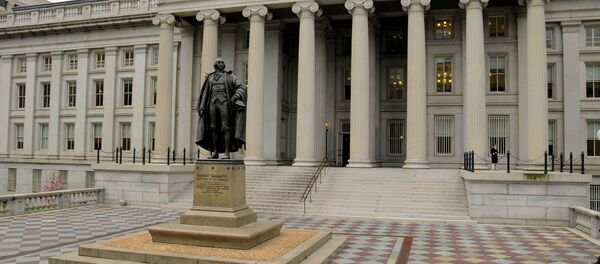Kristian Rouz – The euro’s FX rate dropped after the deadly terror attacks in Germany and Turkey, which, coupled with the lingering economic anxiety in Japan, pushed the US dollar to a fresh 14-year high, and the Swiss franc to its six-month high.
Tuesday’s currency trading was badly shaken by the grim news from Germany, where a lorry ploughed through a crowd of Christmas fair attendees in Berlin, and Turkey, where the Russian ambassador was shot and killed while delivering a speech at an art gallery. The euro subsequently dropped below $1.036 as fears of escalation in violence and uncertainty over immigration across the EU might reflect poorly on the economy.
“The geopolitical backdrop to trading on Tuesday has darkened in the last 24 hours,” Kathleen Brooks of City Index, wrote. “The Russia/Turkey issue could make an already tense situation in Syria worse, so we will look out for further information on this shooting on Tuesday.”
Meanwhile, the dollar strengthened further, which is hardly great news for the US non-financial sector. The weaker Japanese yen and a gauge of other Asian currencies render these nations’ exports in manufactured goods increasingly competitive in the US consumer market, undermining the President-elect Donald Trump’s agenda of American re-industrialisation.
"The biggest impact you see from the attacks in Berlin and (Ankara) is the Swiss franc/euro," Alvin Tan of Societe Generale said. "But apart from that the dollar continues to be strong after we had some rather positive comments from Janet Yellen."
Yellen, the Chair of US Federal Reserve, said on Monday she expects further consolidation in the US labour market. Her comments pushed the US Dollar Index, a measure, tracking the greenback against a basket of its major peers, to 103.65 its highest since January 2003.
"The short version of what I have to say is that while I expect workers will continue to face some challenges in the coming years, I believe, for two reasons, that the job prospects and career opportunities for new graduates at this time are very good," Yellen said, particularly emphasising the US unemployment rate having dropped to 4.6pc.
"The dollar and bonds have been trading in lockstep," Ellis Phifer of Memphis, TN-based Raymond James said. "There are still concerns spending will increase and more debt supply will be on its way."
All these developments suggest that the influx of capital into the US amidst political volatility, violence, and economic uncertainty in other parts of the world created a superficial market oversaturation with capital, which ultimately fails to translate into real economic expansion, higher wages and more affordable living.



